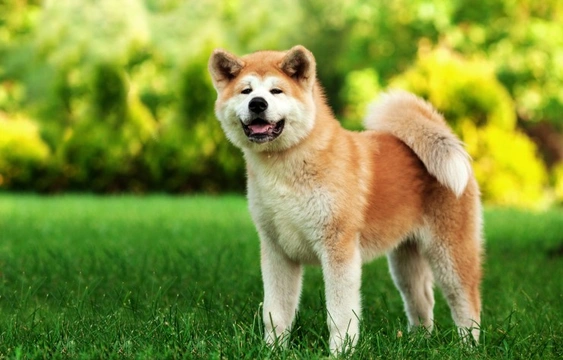
Finding out more about the large, bold Japanese Akita dog breed
The Japanese Akita is a large, bold and very furry dog of the spitz type, which originated in Japan. Today, two different variants of the Akita breed are recognised-the Japanese and the American Akita respectively, although they do of course share a lot of common history!
The large, impressive and confident appearance of these dogs makes them very appealing to many potential owners-but the Akita is not a good fit for everyone, and many first-time Akita owners soon find that they have bitten off more than they can chew! However, they also make for very loving, loyal and entertaining companions for people who know what they are getting into, and are sure that they can cope with the care, training and management required of dogs of the breed!
Whether you already own an Akita, are considering buying one or just want to find out more about this bold and distinctive breed, in this article we will share six interesting facts and snippets of information about the breed to help you to find out more.
Akitas are very clean dogs, and somewhat cat-like!
Dogs are fairly well renowned for being mucky creatures that will happily roll in pooh, eat disgusting things and generally aren’t afraid to get dirty, but the Akita is something of an exception in this regard.
Akitas very much dislike being dirty or messy, and they are very finicky about how they take care of themselves, spending significant amounts of time grooming their coats and arranging their fur just so. They are also one of the easiest breeds to house train, as they are both bright and motivated to learn.
They can take a long time to warm up to strangers
Akitas make for great guard dogs, and if left outside they will keep an alert eye out for strangers approaching, making a lot of fuss to alert you and in some cases, physically blocking the gate to keep them out! They are naturally very independent and can come across as almost aloof when meeting new people, and it would be unwise to approach an Akita on their home territory without their owner there to manage the meeting.
When they meet and interact with new people, the best you can usually hope for at a first meeting is tolerance, and they can take a long time to warm up to new people and begin to see you as part of their family!
They form strong bonds and love for life
When you do earn an Akita’s love and trust, they are loyal, very personable dogs that will stick with you for life, and that will be very rewarding and make for a great addition to the family. They can be very protective of younger family members and are almost like nannies with small children that they see as part of their packs, but they will also put children in their place and not take a lot of nonsense, so it is important to supervise them when together.
Akitas remember people that they have bonded with and that have been kind to them for life; one famous tale tells the story of an Akita named Hachiko, who returned to the same train station every day for nine years to wait for the arrival of his owner, who was sadly deceased.
They are very important in their home country of Japan
The Akita is a uniquely Japanese dog, and they have had an important part to play in Japanese history for hundreds of years. Originally, the only people who were allowed to own Akitas were the imperial family, or people that they gifted them to.
When Akitas were given as gifts, a colour-coded collar and lead would accompany them to dictate the rank and position of their owner! Also, it is still traditional today to give the parents of a new born baby a small statue of an Akita as a symbol of good luck!
The Akita is perfectly evolved for life in cold climates
The Japanese Akita was originally known as the “snow country dog,” and they are uniquely well designed for life in cold and inhospitable weather! Their feet are webbed to assist with walking on snow, and their front claws can also function as mini ice picks, to help them to grip! Their dense, double-layered fur ensures that they stay warm whatever the weather, and helps to repel snow and rain too.
They can be stubborn and independent
Akitas are very independent, intelligent dogs that can be stubborn, which means that they do not make for good pets for everyone. That, added to their large size and superior strength, means that you will never win a physical struggle with an Akita, and will instead have to train and manage them carefully to ensure that they do not get the upper hand.
Firm, well structured positive reinforcement training is vital for the Akita, and they are not a good first pick for inexperienced owners!



